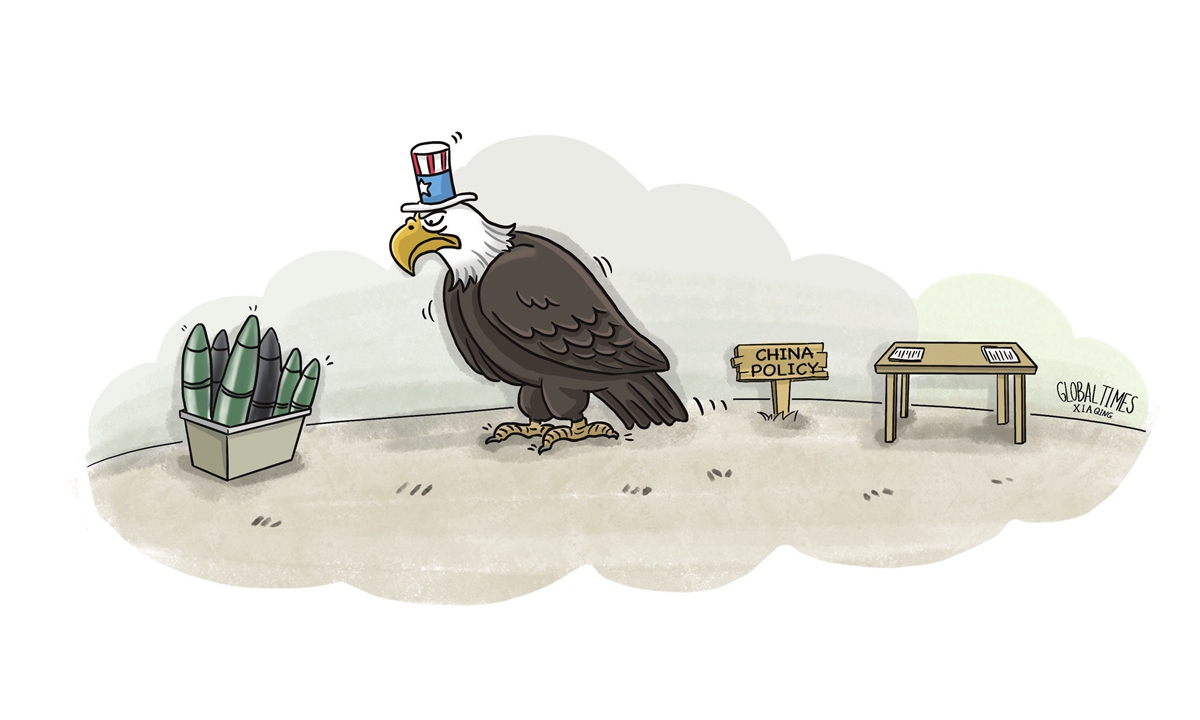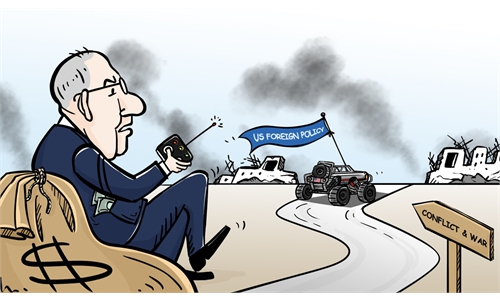A militarized foreign policy is forcing the US to careen toward a war with China

Illustration: Xia Qing/GT
Why does the US secretary of state appear to be a mere impotent advisor in the shadow of the Secretary of Defense? The answer is of course not a coincidence, but the result of a toxic combination of the defense industry, retired military officer interests, and the atrophy of the professional foreign service. Together they have gutted the relevance of traditional US diplomacy.
Many will object and insist on the continued primacy of diplomacy in all US foreign policy. One prescient test would be to query the Secretary of State's depth of familiarity with the perspectives of our main competitor China on the sensitive issue of Taiwan island.
Since alternative futures of war or peace are at stake, has the US secretary of state taken the time to read the Peoples Republic of China white paper titled "The Taiwan Question and China's Reunification in the New Era?" If so, has he met with his Chinese counterpart to jointly develop a responsible way forward to avert an otherwise certain war?
There was a time when learned American statesmen had decisive influence. From Thomas Jefferson and Daniel Webster to George C. Marshal and Henry Kissinger advised presidents on foreign policy, with sustainable peace and the greater good as their only motives.
However, following the 1st Gulf War, something changed. After military indecisiveness in Korea, defeat in Vietnam, followed by the humiliation of the failed rescue of US hostages in Iran and the tragic bombing of the Marine Barracks in Lebanon, Americans were rightfully hungry to recover lost military clout on the world stage.
The overwhelmingly one-sided victory of the US over Iraq during Operation Desert Storm gave Americans a taste of greatness and fueled a sense of patriotism not seen since their victory in WWII.
Generals and admirals became objects of public reverence, relegating controversies of Vietnam era Generals to history. Combatant commanders, empowered with the Goldwater Nichols Act and some educated at Ivy League schools, began to eclipse the influence of ambassadors.
All the while the State Department became more politicized with presidential appointees coming to fill posts as far as five levels down. Preferring to do the bidding of elected officials for career survival, the exercise of independent professional judgment became rare. Today the under- valued and resourced US foreign service appears to be in decline.
In contrast, even in their retirement senior Flag officers remain ambitious and refuse to simply fade away as General Douglas MacArthur once preferred of old soldiers. General Collin Powell was the first to ride the euphoric wave of the 1st Gulf War victory to a new career as Secretary of State.
More recently Generals James Mattis and Lloyd Austin took leave from their well-compensated positions as defense industry board members to serve as Secretary of Defense. The retired four- star revolving door between industry and government employment is now the norm. These elite positions are taken for granted as entitlements, even though the operational performance of most has been miserable.
Generals and admirals, both active duty and retired, are now turned to as the most coveted presidential advisors on foreign policy. Naturally, their cultural toolbox contains mostly hammers and most foreign policy challenges appear as nails. Fewer nonmilitary courses of action are offered the presidents, even when they are called for.
But their militarily honed characters are considered above reproach by default, and their credentials often outshine those of the professional foreign service. US foreign policy has become militarized in the process.
The retired military officers are also the most visible media pundit-experts when it comes to foreign policy discussions. Ambassadors and career foreign service officers that urge restraint are dismissed as weak and unpatriotic. They are normally not invited as media guests because they don't lean forward fueling public emotions that generate advertising revenue.
The propagandistic power of the US media amplifies calls for military resources and solutions in an echo chamber that now can even influence civilian elections. Congressional and presidential candidates that may believe in peace are easily turned during campaigns and become war hawks in office because military pundits can shape public opinion.
Returning to relations with China, any traditional diplomatic common sense has been drowned out by military war drums of the US' militarized foreign policy. The well-funded information and material preparations for war over Taiwan island are accelerating.
The author is a retired Marine Corps infantry officer and a former Pentagon employee. Opinions are of the author and do not represent the US government. opinion@globaltimes.com.cn

